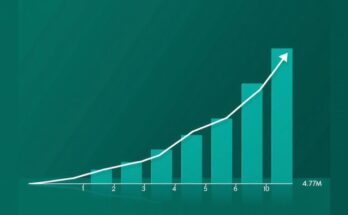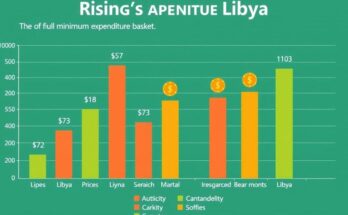Ghana’s inflation rate fell to 23.1% in February 2025, driven by a decrease in food inflation to 28.1%. Non-food inflation also declined slightly, standing at 18.8%. The Upper West Region exhibited the highest food inflation rate at 49.8%, while specific food items experienced significant price increases. Despite improvements, February’s rates remain among the highest in recent months.
Ghana’s inflation rate experienced a slight decrease in February 2025, falling to 23.1% from January’s 23.5%. This decline was mainly attributed to a 1.8% reduction in food inflation. The food inflation rate now stands at 28.1%, down from 28.3% in the previous month, whereas non-food inflation has also decreased from 19.2% to 18.8%.
The Upper West Region reported the highest food inflation rate at 49.8%, followed closely by the Savannah Region at 48.6%. Notably, food inflation has shown a steady downward trend, with a total decrease of 2.0 percentage points from November 2024 to February 2025, as stated by Government Statistician Prof. Samuel Kobina Annim.
Despite the overall decline, Ghana’s inflation rate of 23.1% in February ranks as the third highest recorded within the past ten months. Among specific food categories, price increases were significant, particularly in ready-made food and other food products, which increased by 45.5%. Other notable increases included cereals and cereal products at 38.6%, and fish and seafood at 26.5%.
The non-food inflation rate, while also declining slightly, decreased to 18.8%. The Upper West Region not only topped food inflation but also had the second-highest non-food inflation rate at 24.0%. The Savannah Region follows closely behind, indicating regional disparities in inflation trends across the country.
In conclusion, Ghana’s inflation rate has shown a slight decline, primarily influenced by reducing food inflation. However, the rates remain elevated, with specific regions experiencing particularly high inflation levels. Notable price increases in various food categories further highlight the challenges faced by consumers in Ghana, despite the overall downward trend. Continuous monitoring will be essential as the government addresses these inflationary pressures.
Original Source: www.ghanaweb.com




